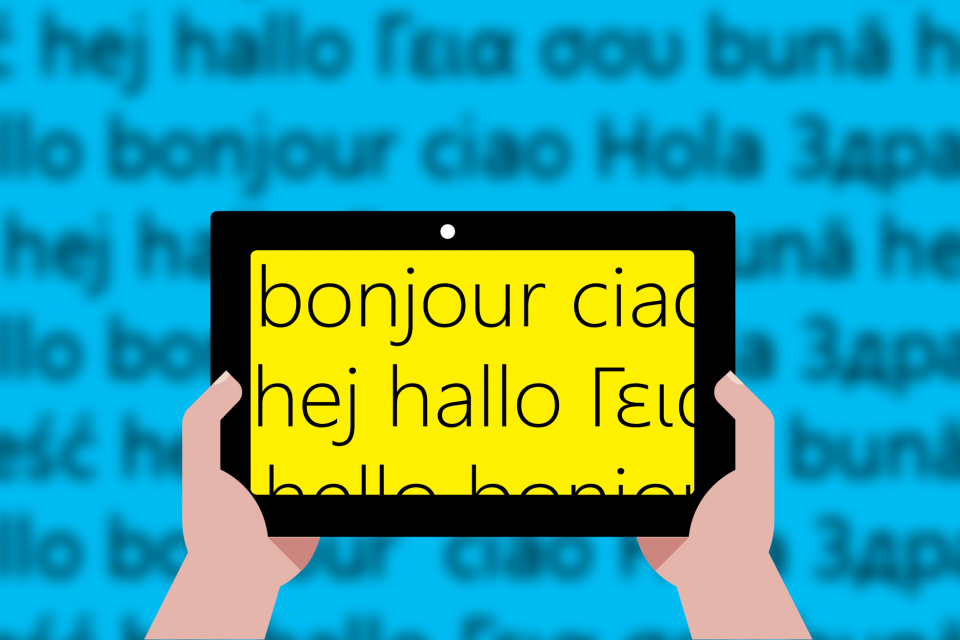According to a European Commission survey, even though most Europeans think it’s useful to speak another language, most don’t consider themselves to be actively learning one. And although we know that having a digitally-connected region depends on cross-lingual communication, the reality is that only about 2 of every 5 people in Europe understand a foreign language well enough to be able to communicate online. What’s more worrying is that Europe’s 60+ regional and minority languages are at risk of being lost to mainstream languages.
Most Europeans blame their missing language skills on lack of time, money or motivation. But now technology is promoting rich linguistic diversity by making language education more accessible.
![EDON[1]](https://news.microsoft.com/wp-content/uploads/2015/03/EDON1.png)
Learning a language virtually could address the distance, time and cost that people say is holding them back. Belgian web-based school, The English Academy Online, provides private English coaching to adults via Skype. The school’s director, Edgard Frederix, considers this to be “an easy-to-use, flexible and very reliable” solution to give students outside Brussels access to coaches and resources.
Spanish tutor Vanessa Pérez, who uses Skype to provide personalised teaching to students in London, explains how the tool provides an efficient way to practice different language skills:
“Some students just need to practice speaking, listening and conversation, and as lessons are cheaper using Skype, I can tutor online that way.”
![SI[1]](https://news.microsoft.com/wp-content/uploads/2015/03/SI1.png)
This type of language technology can help motivate migrant communities integrating into a new country to learn a new language and become more socially included. This issue is particularly relevant in a region as ethnically-diverse as Europe with at least 175 nationalities.
In Sweden, Reza Mirza, originally from Afghanistan, commented on the initial problems he faced: “The Swedish language is extremely difficult when coming from Afghanistan. I didn’t dare to ask when I didn’t understand something.” Through a cooperative project by the city of Stockholm, Microsoft and 2 Swedish universities, Reza was one of many students able to boost his confidence and motivation through online instant messaging that gave him access to teachers with whom he could practice Swedish language skills and get help with homework. Anna König Jerlemyr, the Deputy Mayor for the Social Affairs Division of Stockholm City, commented on how vital such programs are to opening up opportunities for young people:
“Technology is enabling these young people to tear down linguistic barriers that would prevent them from getting jobs and a higher education.”
![Reza[1]](https://news.microsoft.com/wp-content/uploads/2015/03/Reza1.png)
Technology can also help keep regional and minority languages in active use in education, vital for the more than 60 regional and minority language groups across Europe.
In the United Kingdom, Cerith Rhys Jones, the Welsh Students Officer at Cardiff University, helps Welsh-speaking students to integrate the Welsh Language Interface Pack for Windows, SharePoint, and Office into their studies, such as using Bing Translator to translate documents from English to Welsh. Cerith believes that this kind of technology plays an important role in “normalising” the Welsh language so that other Welsh speakers could feel confident in using it.
![Cerith[1]](https://news.microsoft.com/wp-content/uploads/2015/03/Cerith1.jpg)
Evolving technology has the potential to reinvent language education. Tools such as Skype Translator that translate speech in real time will revolutionise communication and the way students learn and interact with the world. Properly understanding someone else’s culture and values depends on learning their language – and technology can be the facilitator.




![LF[1]](https://news.microsoft.com/wp-content/uploads/2015/03/LF1.png)

